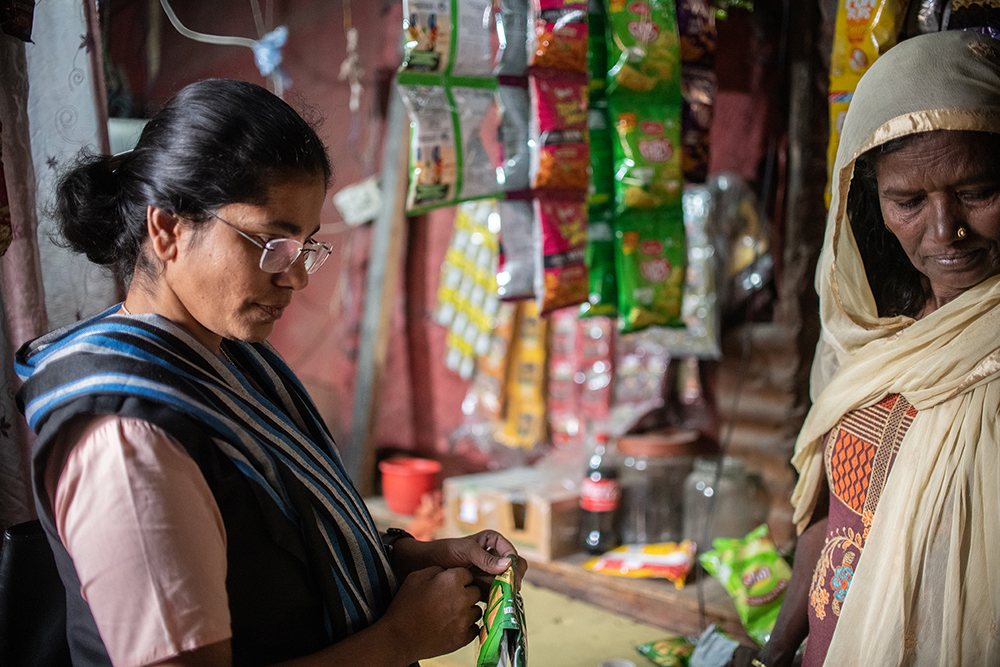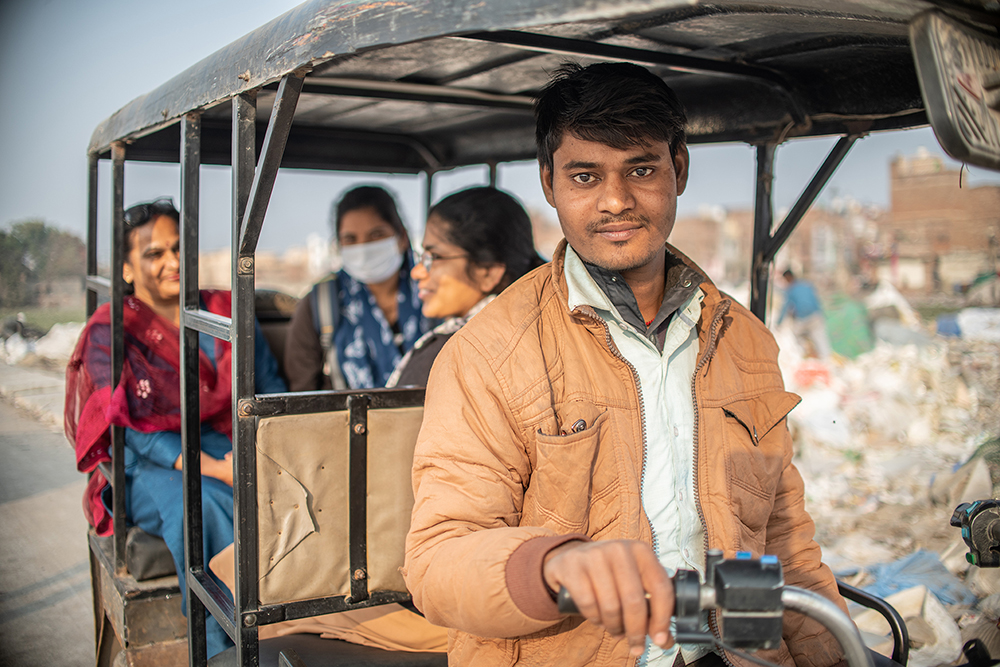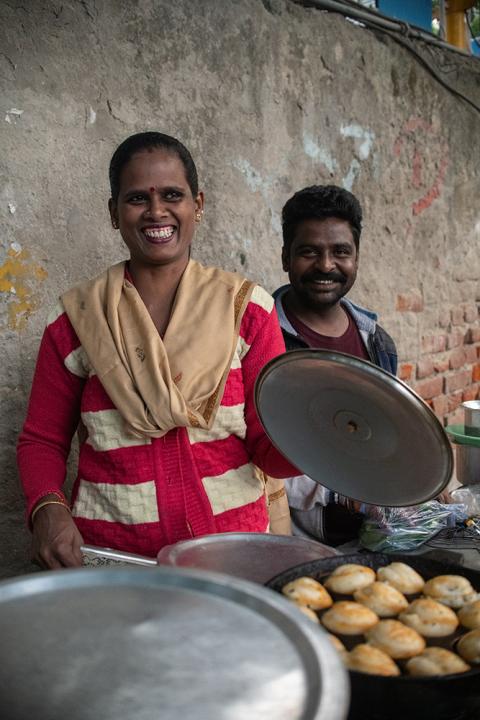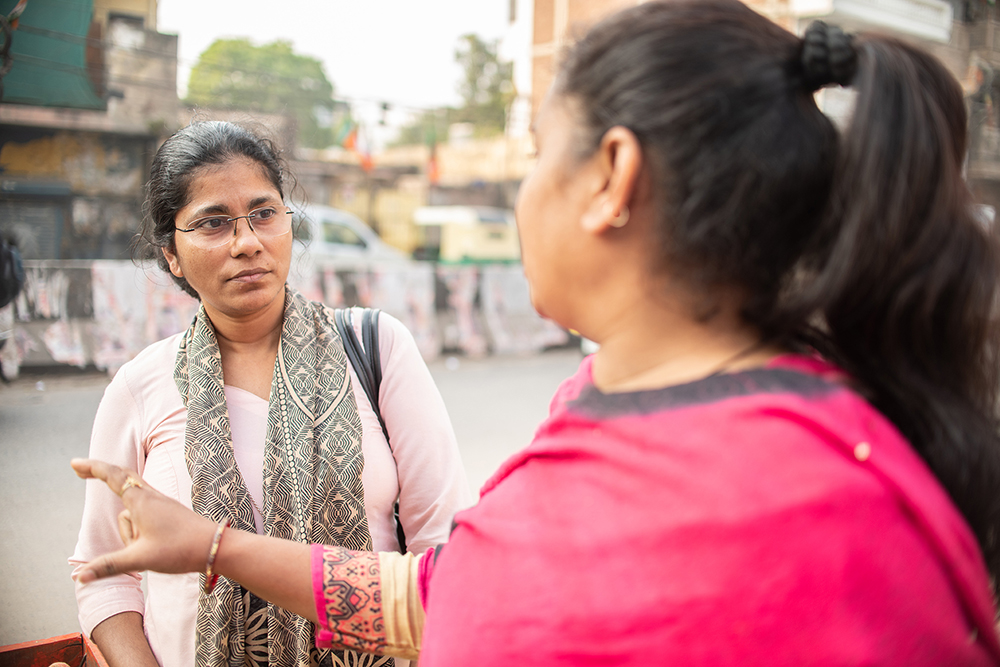
Sr. Rani Punnaserril, a member of the Sisters of the Holy Cross Menzingen, visits Sabila Khatoon’s shop, which sells mainly chips, biscuits and snacks for children, The shop is now a source of a steady income for her. (Photo courtesy of Mubeen Siddiqui/ICMC)
It has been well documented that the impacts of COVID-19 on any one person are significantly influenced by that person's socioeconomic status.
In the United States, for example, where economic disparities became obvious during the pandemic, poorer Americans have experienced much higher hospitalization rates, sometimes due to delays in seeking care — because of health care costs. Those Americans are also more likely to die from a COVID-19 infection. More affluent people with office jobs, by contrast, could easily switch to working from a home office during lockdowns, and their children could likewise attend classes online. They were typically less exposed and better prepared to handle illness from COVID-19, because they have more resources.
Imagine that dynamic playing out in India. On March 24, 2020, Prime Minister Narendra Modi announced a strict, near absolute lockdown across the whole country, giving a nation of 1.3 billion people about four hours to react. Although figures vary according to the source, about one-quarter of India's people are categorized as belonging to the scheduled castes (Dalits) or scheduled tribes (Adivasis), otherwise known as, in the most obvious statement on their position in society, the "untouchables." Despite the caste system having been officially abolished with independence and the 1950 constitution, the 3,000-year-old system of assigning people their place in the hierarchy from birth persists.
This meant disaster for some 140 million migrant workers who had moved to urban areas for economic opportunities, where they found fewer restrictions related to that very same caste system. In the city, that caste identity became slightly less discernible. Bricklayers, tuk-tuk drivers (three-wheeled e-taxi drivers), and bicycle couriers were suddenly scrambling to find a way out of the city, knowing there would be no work and no way to eat. These workers live hand-to-mouth each day, and anything they can save they send to support their families. They were cramming into buses and trains, if they were lucky enough to get a ticket. And an estimated 10 million people started walking, grabbing whatever they could take, carrying their children, to make it to their home villages and their distant families. Some people walked for a week. Many never arrived home.
Sr. Rani Punnaserril, a member of the Sisters of the Holy Cross Menzingen, lives in Delhi and works for the Archdiocese of Delhi, where she is the secretary of the Commission for Migrants for Delhi and the north region for the Conference of Catholic Bishops of India, or CCBI. In those early days of COVID-19, "We were overwhelmed just trying to keep people from starving," she said.

Sr. Rani Punnaserril, a member of the Sisters of the Holy Cross Menzingen, visits Sabila Khatoon’s shop, which sells mainly chips, biscuits and snacks for children, The shop is now a source of a steady income for her. (Photo courtesy of Mubeen Siddiqui/ICMC)
GSR: What were you doing to help people when the lockdown first hit?
Punnaserril: When people were shuttling from the cities to the villages, whether trekking on foot or having found a ride on a lorry, they also needed food, water and other things. So religious organizations were out on the road helping them by giving them food packages and water. By then, it was April and May, and it was hot. People were exhausted. They could not walk. So people with a bit of humanness — a bit of heart — came to the side of the road to give them food and drink.
There were also people living in shanties who did not want to move because they were afraid and didn't have anywhere to go. Many domestic workers who lost their jobs could not go anywhere because they had rented rooms, and because their children were with them. Some were single mothers. When they were let go by their employers, most of them weren't paid their last salaries, severance pay or other dues. They had no money to go anywhere. So we were delivering cooked food to those people, and also giving out rations so they could cook their own food.
I am an advocate and practice in the Supreme Court. We were approaching the Supreme Court and the High Courts to have them direct the government to ensure that they were providing the people with rations, as the government had said it would. As an emergency measure, the government announced it would provide rations even to the many people who were never issued a ration card, in some cases for years, despite having applied several times. States regularly ran out of ration cards because the quotas are based on the 2011 census and thus extremely dated. The next census was supposed to be done in 2021, but it has been delayed by the pandemic.
People were not getting their rations, so after the first month, I was barely at home. I was out on relief work. I did not want to come home because we have a cancer hospice where I live, and I did not want to expose anyone who was already weak to the virus. When I did come home, I would quarantine for a week to be sure I did not transmit the virus. But then we would have so many new requests for assistance, so we would go out in teams again to bring help to people. We had sponsors and donors to support us, and we had pharmacies that were also providing hand sanitizers that we could donate to the neediest and the most vulnerable people.

Raja Ram, 26, worked as a porter in a factory before COVID-19 hit Delhi. He lost his job when the company closed during a three-month lockdown. He obtained a used electric rickshaw, but it came without a battery. With financial assistance from Chetanalya, a nonprofit, he bought a battery and started earning again. (Photo courtesy of Mubeen Siddiqui/ICMC)
We were also helping some people with rent payments. Sadly, we could not help everyone, so we were helping those who were worse off, such as single mothers, widows and people with disabilities. We received financial support from the Sisters of the Holy Cross Menzingen, CCBI's Commission for Migrants and Justice Kurian Joseph (a retired Supreme Court judge). We were able to employ some people in our diocesan institutions, and we could help some children with their education through Catholic and congregational schools.
How were people faring in their home villages?
After a few months, most of them slowly started returning to the city. We helped some people in rural areas to start an activity such as goat rearing, which has helped many. Others have been able to continue their activity, such as shoemaking, in their villages.
But many rural people had no land, or not enough land to be able to make a living from it. They could only grow enough food for their own consumption, but could not sell anything. Agriculture is also seasonal, so it becomes too difficult between harvests. So people started returning and hoping to take up their old jobs. But often, that job no longer existed. Many businesses shuttered or cut back, and so these migrant workers were still unemployed, waiting to be hired. The shop owners themselves were suffering. They could not hire anyone, because they had survived off their own stocks from their stores, and even they could not restart their activity.
So what happened then, if people were still not finding work?
People were coming to us wanting to either start a new activity or restart an activity that they had before the shutdown. I made a request to Fr. Jaison Vadassery, the executive secretary to the Commission for Migrants of the Conference of the Catholic Bishops of India and a regional representative as a member of the Governing Council of the International Catholic Migration Commission (ICMC). He worked with ICMC to propose a project to access more funds to help the people coming to us, especially the domestic workers, the daily wage workers, and the e-rickshaw or tuk-tuk operators. I told them: "My diocese is suffering, and my region is suffering, but I don't have any funds to help them." ICMC helped us fill those gaps with support from the Raskob Foundation.
The domestic workers were generally not called back to their jobs, even if they had been promised that they would be rehired. Since many of them already had cooking skills from their employment, several of those women proposed launching a food stand or pushcart business.

Kevalli, 38, moved to Delhi when she married into a Tamilan community. When the COVID-19 lockdown started, she was asked not to come to work until the lockdown was lifted. She was never called back to work. She used financial help to set up a stall selling appam, a South Indian fried snack, with the help of her brother-in-law, Arun. (Photo courtesy of Mubeen Siddiqui/ICMC)
For example, one woman named Kevalli submitted a proposal to start a stand selling appam, a fried street food from South India made from a batter of fermented rice with coconut, with some lentils or vegetables mixed in. They look a bit like muffins. She needed the start-up funds to buy the fuel, the utensils, the cookware and other supplies. She now does brisk business at the end of the day when people are headed home.
The people whose proposals were accepted had to take part in trainings in entrepreneurship, bookkeeping, inventorying and other skills that would help them be successful in their ventures.
How are all of the projects proceeding now?
We are constantly following up and supporting them, and they are growing and doing well. Many are asking for support to expand their businesses. Unfortunately, we lost three of our project beneficiaries who passed away.
Did they die of COVID-19?
No, they passed away from tuberculosis, which is still present in parts of India. The problem is the lack of awareness about it, because it takes funding and staff to raise awareness. Sometimes health workers ride with us if we visit people, to give them some assistance.

Sr. Rani Punnaserril, a member of the Sisters of the Holy Cross Menzingen, visits Monica Singh and Manoj Kumar's vegetable cart in Delhi. (Photo courtesy of Mubeen Siddiqui/ICMC)
Most people weren't suffering from COVID per se, but from the effects of COVID and the problems that emerged because of COVID. People were jobless. They fell into depression. There were high rates of suicide. And many people are still depressed, or stressed because they worry about their children's futures. It is very expensive to raise a dowry to have a daughter marry in India, and now most of those savings are gone. People have fallen into debt.
We ran support programs over the phone, when we couldn't be with people physically, so they wouldn't feel alone. We wanted to help them be strong psychologically so that their minds are strong.
What do you think the most important aspect of this work is?
The most important aspect is the dignity of work. Many of the workers would not have had all the problems they had if their employers had treated them with dignity. But because of the caste system, the people from the lower castes are not treated like individuals or human beings. They are not even called by their names. A domestic worker in a wealthier person's home is called "worker" or "girl." If you are a gardener, people call you "gardener"; if you are a driver, they call you "driver."
Advertisement
There is a minimum wage, but often these workers are paid below minimum wage. If they are sick, they don't get paid. They cannot avail of medical leave. They were not paid severance when they were let go. And even though there was supposed to be some government assistance, it rarely reached them. Though there was a government decree not to force people to pay rent, these people were being evicted.
People of lower castes must be aware that they have rights, and that they must fight for those rights because India has a long history of discrimination. They might not be educated. It is hard for them to get an education. The government has created quotas so they are represented in government positions, but they often are unaware, and without an education, they won't get the post.
It is important that we help them organize, so they are aware of their rights and know how to have their rights respected. We work with the National Domestic Workers Movement, social service centers of the dioceses and congregations, and other civil society organizations, so that they can advocate for their rights and to be treated with human dignity.




